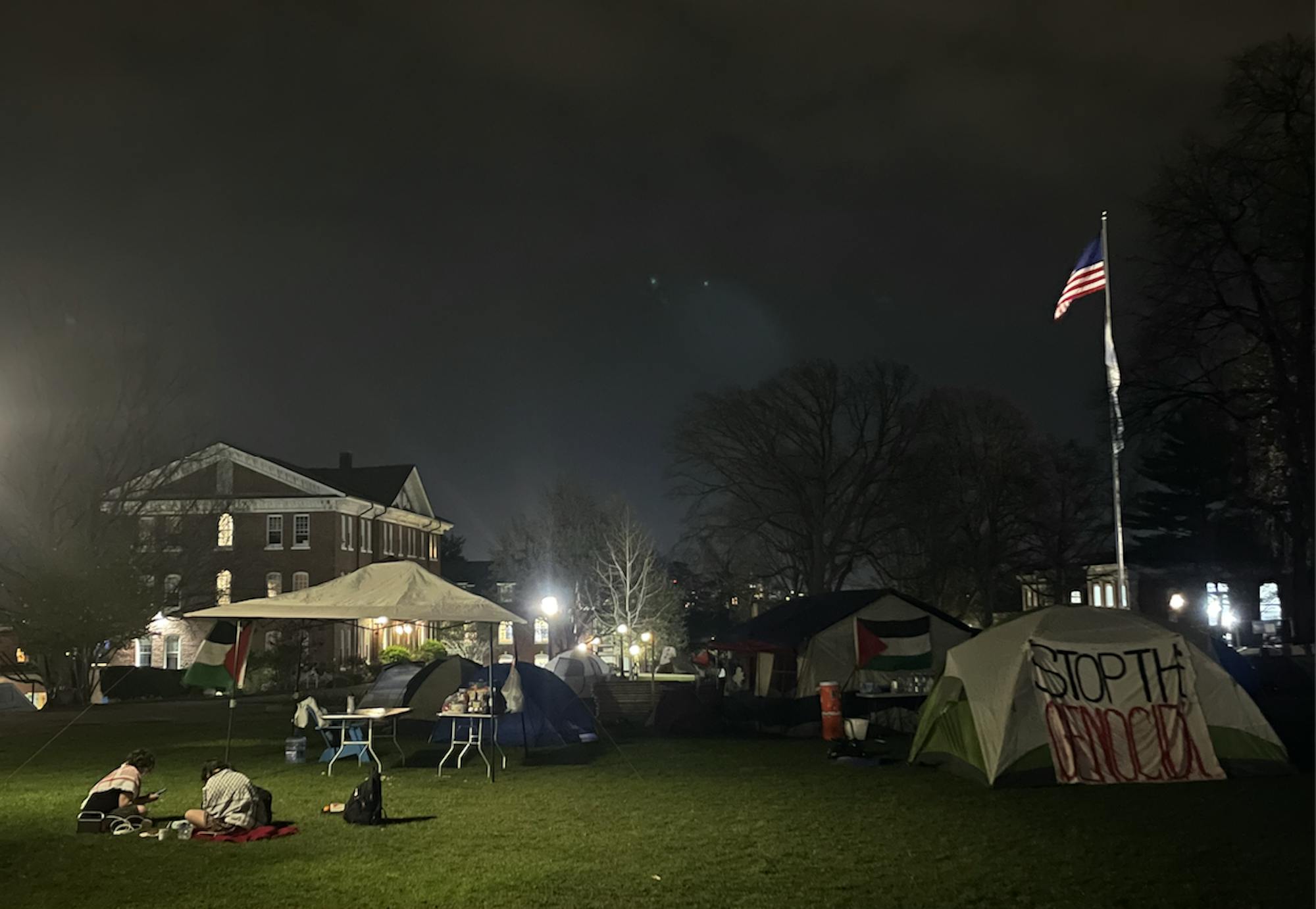In an email sent to Tufts community members on Sunday evening, University President Sunil Kumar and four other university leaders addressed the “Gaza Solidarity Encampment” for the first time since student protesters erected it on April 7, requesting that the tents be taken down to allow the university to prepare for Commencement. Shortly after, Tufts Students for Justice for Palestine reaffirmed in an Instagram post that they will not leave the Academic Quad until the university divests from Israel, ends the sale of Sabra and other Israeli products at Tufts dining locations, “[acknowledges] the genocide in Gaza” and “[apologizes] for previous statements.”
“All eyes on Gaza. We won’t back down,” Tufts SJP wrote in a message to the Daily less than 30 minutes after the email was sent.
Kumar, joined by Caroline Genco, provost and senior vice president; Michael Howard, executive vice president; James Glaser, dean of the School of Arts and Sciences; and Kyongbum Lee, dean of the School of Engineering, did not explicitly address these demands in their email.
“Over the past two weeks, we have respected our community members’ right to advocate for their beliefs through a small campsite on the academic quad on our Medford/Somerville campus,” the administrators stated. “But now the encampment must end, ideally peacefully and voluntarily, so we can prepare the campus for Commencement. Student Life staff will be reaching out to the protesters tomorrow morning to plan for the end of the encampment in the next few days.”
In the email, the administrators wrote that “the class of 2024 deserves to be celebrated,” noting that many current seniors missed out on their high school graduations due to the COVID-19 pandemic.
“We are committed to maintaining an environment that will allow our students to finish the academic year strong and for the entire community to celebrate the class of 2024 at Commencement without disruptions,” they wrote.
The administrators stressed that Tufts has made ongoing efforts to “maintain open lines of communication” with protesters and to avoid “the escalation we have seen at other universities across the nation.” Since students at Columbia University first set up their encampment on April 18, over 800 protesters have been arrested on college campuses across the country.
In the email, the administrators also pointed to Tufts’ “time-honored tradition of civil protest,” claiming that, since the current wave of pro-Palestine protests began on campus, the university has respected students’ right to protest while also sanctioning students who have violated the university’s conduct policies.
This past weekend, student protesters at Tufts organized their largest demonstration yet, in which over 300 Tufts students, local high schoolers, and residents from nearby areas gathered on Tufts’ campus to rally in solidarity with Gaza. Protesters marched from the Academic Quad to the Mayer Campus Center, using chalk to write pro-Palestine slogans on campus buildings. In their email, the administrators referenced Friday's protest, stating that, while “much of Friday’s demonstration was peaceful,” many of the demonstrators’ actions violated university policies.
“Demonstrators entered a classroom, blocked paths, and defaced, stickered, and scrawled obscene language on buildings throughout the campus. Even beloved spaces such as Alex’s Place on the Tisch Library roof and the Jumbo statue were marred,” the administrators wrote. “Additional actions from the protestors throughout Friday and Saturday made multiple visitors at Friday’s Jumbo Days and Saturday’s admissions tours feel afraid and unwelcome, resulting in numerous complaints.”
The administrators pledged to “investigate every single complaint and hold those responsible fully accountable.”
Following Friday’s protest, Tufts SJP contacted administrators to “open a line of communication about demands issued by SJP and the larger Coalition of Palestinian Liberation,” as stated on its Instagram. In their email, the administrators declined protesters’ request for a meeting, writing that they would not meet with students until they cleared the Academic Quad.
“Their request, which includes a threat to continue disruption, only comes after they have escalated their actions, caused intentional and malicious harm to our community and campus, broken multiple university policies and, most importantly, violated the values and norms of the institution,” the administrators said. “A meeting cannot be a reward for such behavior.”
Toward the end of their email, the administrators listed ways that Tufts “may be able to help people in Gaza and those affected by the war in our community in the ways an educational institution can,” citing the university’s support for Scholars at Risk and its commitment to eventually helping to “rebuild the educational infrastructure in Gaza.”
“As we have said before, we are deeply troubled by the tremendous loss of Palestinian life, and we desire to work with all members of our community to support both the Palestinian and the Israeli people,” they wrote.






